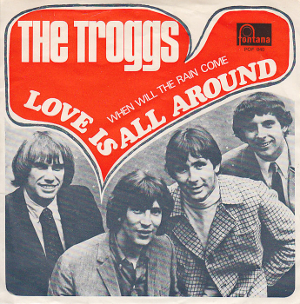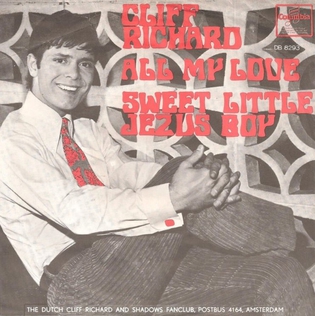
The Hollies are a British pop rock group formed in 1962. One of the leading British groups of the 1960s and into the mid 1970s, they are known for their distinctive three-part vocal harmony style. Allan Clarke and Graham Nash founded the band as a Merseybeat-type music group in Manchester, although some of the band members came from towns further north in East Lancashire. Graham Nash left the group in 1968 to form Crosby, Stills & Nash.

"You Keep Me Hangin' On" is a song written and composed by Holland–Dozier–Holland. It was first recorded in 1966 by American girl group the Supremes, reaching number one on the Billboard Hot 100. American rock band Vanilla Fudge released a cover version in June of the following year, which reached number six on the Billboard Hot 100. English singer Kim Wilde covered "You Keep Me Hangin' On" in 1986, reaching number one on the Billboard Hot 100 in June 1987. In the first 32 years of the Billboard Hot 100 rock era, "You Keep Me Hangin' On" became one of six songs to reach number one by two different musical acts. In 1996, American country singer Reba McEntire's version reached number two on the US Billboard Hot Dance Club Play chart. The BBC ranked the Supremes' original song at number 78 on The Top 100 Digital Motown Chart, which ranks Motown releases by their all-time UK downloads and streams.
Recorded Music NZ is a non-profit trade association of record producers, distributors and recording artists who sell recorded music in New Zealand. Membership of Recorded Music NZ is open to any owner of recorded music rights operating in New Zealand, inclusive of major labels, independent labels and self-released artists. Recorded Music NZ has over 2000 rights-holders.

"I'm a Believer" is a song written by Neil Diamond and recorded by the Monkees in 1966 with the lead vocals by Micky Dolenz. The single, produced by Jeff Barry, hit the number-one spot on the U.S. Billboard Hot 100 chart for the week ending December 31, 1966, and remained there for seven weeks, becoming the last No. 1 hit of 1966 and the biggest-selling single for all of 1967. Billboard ranked the record as the No. 5 song for 1967. Because of 1,051,280 advance orders, it went Gold within two days of release. It is one of the fewer than forty all-time singles to have sold more than 10 million physical copies worldwide. While originally published by Screen Gems-Columbia Music (BMI), it is now published by Stonebridge Music/EMI Foray Music (SESAC), with administration passed to Sony/ATV Music Publishing and Universal Music Publishing Group.

"Somethin' Stupid", or "Something Stupid", is a song written by C. Carson Parks. It was originally recorded in 1966 by Parks and his wife Gaile Foote, as Carson and Gaile. A 1967 version by Frank Sinatra and his daughter Nancy Sinatra became a major international hit, reaching number one on both the Billboard Hot 100 chart and the UK Singles Chart. In 2001, a cover version by British vocalist Robbie Williams and Australian actress Nicole Kidman reached number one in the UK Singles Chart.

"Love Is All Around" is a song recorded by English rock band the Troggs, featuring a string quartet and a 'tick tock' sound on percussion, in D-major. It was written by lead singer Reg Presley and was purportedly inspired by a television transmission of the Joy Strings Salvation Army band's "Love That's All Around". The song was first released as a single in the UK in October 1967, peaking at number 5. On the Hot 100, the record entered at number 98 on 24 February 1968, peaked at number 7 on 18 May 1968, was on the chart a total of 16 weeks, and ranked number 40 for all of 1968.

"I Was Made to Love Her" is a soul music song recorded by American musician Stevie Wonder for Motown's Tamla label in 1967. The song was written by Wonder, his mother Lula Mae Hardaway, Sylvia Moy, and producer Henry Cosby and included on Wonder's 1967 album I Was Made to Love Her.

"To Sir with Love" is the theme from James Clavell's 1967 film To Sir, with Love. The song was performed by British singer and actress Lulu, and written by Don Black and Mark London. Mickie Most produced the record, with Mike Leander arranging and conducting. The song peaked at the top of the Billboard Hot 100, and became the best-selling single of 1967 in the United States.

"Walk Like a Man" is a song written by Bob Crewe and Bob Gaudio and originally recorded by rock band, the Four Seasons.

"(Your Love Keeps Lifting Me) Higher and Higher" is an R&B song written by Gary Jackson, Raynard Miner, and Carl Smith. It was recorded by Jackie Wilson for his album Higher and Higher (1967), produced by Carl Davis, and became a Top 10 pop and number one R&B hit.

"San Francisco " is an American pop music song, written by John Phillips, and sung by Scott McKenzie. It was produced and released in May 1967 by Phillips and Lou Adler, who used it to promote their Monterey International Pop Music Festival held in June of that year.

"Cathy's Clown" is a popular song, written by Don Everly and recorded by The Everly Brothers in 1960. The lyrics describe a man who has been wronged and publicly humiliated by his lover: "Here he comes / That's Cathy's clown". The choruses are sung by brothers Don and Phil in their trademark close harmony style, while Don sings the bridges solo.

The following is the discography of the American rock band the Doors. Formed in Los Angeles in 1965, the group consisted of Jim Morrison (vocals), Ray Manzarek (keyboards), John Densmore (drums), and Robby Krieger (guitar). The Doors became one of the most popular rock bands of their era. Their debut album, The Doors (1967), released by Elektra Records, charted at No. 2 on the US Billboard 200 and produced the group's most successful single, "Light My Fire". The album received several sales certifications including a four times multi-platinum from both the Recording Industry Association of America (RIAA), and from the Canadian Recording Industry Association (CRIA). The Doors' second studio album, Strange Days (1967), sold well commercially but did not reach the same level of success as the debut, and failed to produce a major hit single. It reached No. 3 on the Billboard 200 and was certified platinum in the United States and Canada. The Doors' third studio album Waiting for the Sun (1968), was very successful, reaching No. 1 in the US and France, and produced their second No. 1 single, "Hello, I Love You". Waiting for the Sun was the first Doors album to chart in the United Kingdom, where it peaked inside the Top 20. The album was certified gold in that country by the British Phonographic Industry (BPI), as well as being certified gold and platinum in several other countries.

"Kentucky Woman" is a 1967 song written and originally recorded by Neil Diamond.

"The Happening" is a 1967 song recorded by Motown artists The Supremes. The song served as the theme song of the 1967 Columbia Pictures film The Happening, and was released as a single by Motown at the time of the film's release that spring. While the movie flopped, the song peaked at number-one on the Billboard Hot 100 pop singles chart in May, becoming The Supremes' tenth number-one single in the United States, peaking in the top 10 on the UK Singles Chart at number six, and in the top 5 in the Australian Pop Chart and in the Dutch Pop Chart.
"Release Me", is a popular song written by Eddie "Piano" Miller and Robert Yount in 1949. Four years later it was recorded by Jimmy Heap & the Melody Masters, and with even better success by Patti Page (1954), Ray Price (1954), and Kitty Wells (1954). Jivin' Gene [Bourgeois] & the Jokers recorded the tune in 1960, and that version served as an inspiration for Little Esther Phillips, who reached number one on the R&B chart and number eight on the pop chart with her big-selling cover. The Everly Brothers followed in 1963, along with Lucille Starr as "The French Song" including a translation in French (1964), Jerry Wallace (1966), Dean Martin (1967), Engelbert Humperdinck (1967) who was number one on the UK Singles Chart and many others in the years after.

"Georgy Girl" is a song by the Australian pop/folk music group The Seekers. It was used as the title song for the 1966 film of the same title. Tom Springfield, who had written "I'll Never Find Another You", composed the music and Jim Dale supplied the lyrics. The song is heard at both the beginning and end of the film, with markedly different lyrics. It was nominated for an Academy Award for Best Original Song.
"The Door Is Still Open to My Heart" is a 1955 song written by Chuck Willis and originally performed by the Baltimore-based R&B vocal group, The Cardinals. In the US, the original version peaked at number four on the R&B playlist and number ten in R&B sales charts. Later in 1955, Don Cornell recorded the song and released it as the B-side to his hit, "Most of All". The Hilltoppers had a moderate hit with this song the same year.

"The Day I Met Marie" is a song by Cliff Richard, released as single in August 1967. The song was written by Hank Marvin and produced by Norrie Paramor.

"All My Love" is a song first recorded in English by Cliff Richard and released as a single in November 1967. The song is an adaption of the Italian song "Solo Tu", written by Federico Monti Arduini and first released by Orietta Berti in April 1967. The song was adapted to English by Peter Callander.
 Single of New Zealand origin
Single of New Zealand origin















